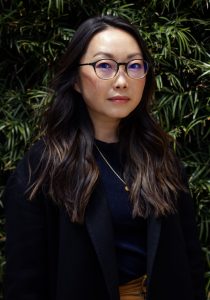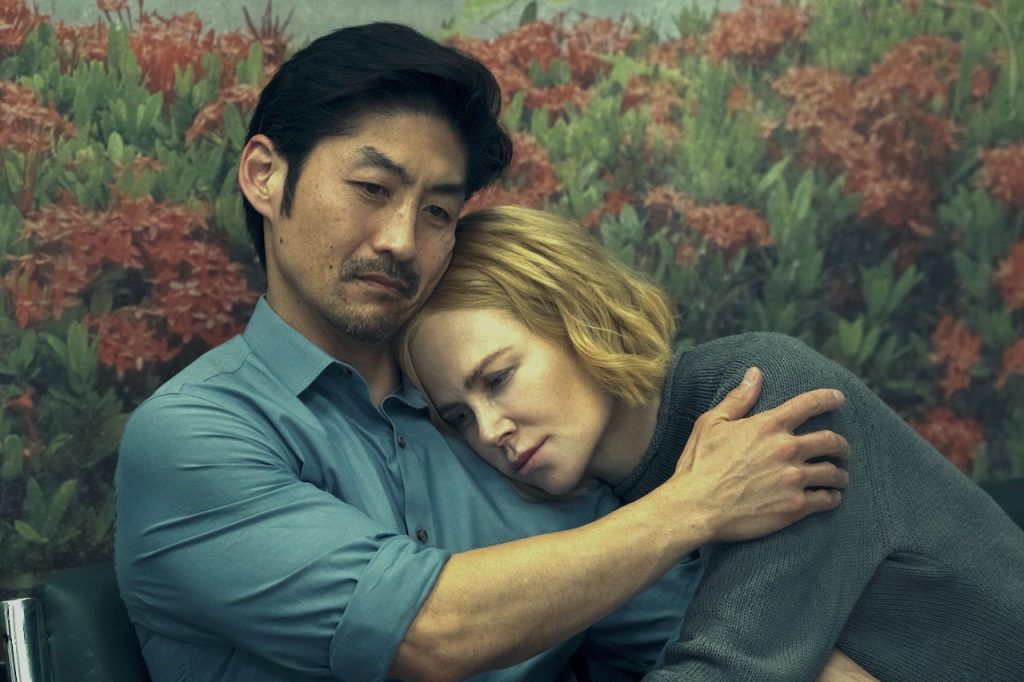“I always knew that I wanted to write in some way. My mother is a writer and I kind of just grew up around writing and literature,” says Lulu Wang. “But, it felt like such a lonely art form, so when I got to college, that was the first time I thought about filmmaking as a career.”
Like many viewers, she hadn’t thought much about the writer behind her favorite shows and movies. “I took a 101 class and that’s when I started to really understand how films and TV are made. We got to make a couple short films, I got to work with my friends, and it was wonderful to be able to create and re-create a story multiple times.”
Wang has seven credits on IMDb including The Farewell and most recently, Expats. In Expats, Nicole Kidman stars as Margaret Woo, an expatriate living in Hong Kong when tragedy befalls her family. “I feel like my style is still evolving,” says Wang. “I’m still learning, but I think early on, the stuff I was drawn to were films that ask an interesting question. I’m just fascinated by people, the way they behave, and human psychology and sociology.”

Lulu Wang. Photo by Elise Roman
“Being an immigrant kid with a big family and navigating multiple cultures, is interesting to me. Exploring human dynamics and of course, humor, is really important to me. I’m not only making comedies. Expats is not a comedy. But I’m looking for humor, even in the dramatic moments.”
Don’t Teach, Just Share
“I never want to teach,” says Wang. “I don’t see my filmmaking as a teaching tool. I try to avoid that because I want audiences to just be engaged in the story. If they happen to say, ‘I never knew that about this culture,’ that’s cool, but I don’t necessarily know what people know or don’t know, so I don’t come from that place of educating.”
Instead, she tries to simply tell a story about a world she knows really well. “Both with The Farewell and Expats, I never look at what’s different about the culture or the setting. All of it has to relate to an emotion, a behavior — it all comes back to character, what they care about, why they’re in that particular place and what they’re doing there.”
She wrote The Farewell on her own and Expats with a Writers’ Room. “That was quite challenging. I talked to friends and producers. I would get notes. It was really eye-opening on The Expats, where I had four other writers. We could try different options and test them in the room.” This freedom allowed for the writers to explore “bad ideas” to unearth the good ideas.
“What if we did a slightly different version that’s not a cliché? It’s great to have that conversation with other people. It’s important to write the bad version of the script because you don’t know why you shut yourself down [as an individual]. Are you shutting yourself down because it’s bad or because it’s too vulnerable?”
Wang continues, “If you have an instinct, it’s important to chase that instinct and not be afraid of writing a bad script. That’s something I learned being in the Writers’ Room. No idea is a bad idea. Put the idea up and do the editing later. You can’t write and edit at the same time. You have to create the clay and then carve it later.”
In order to create this vulnerable space, Wang says on The Farewell, she felt comfortable just asking people for their ideas and being open about her experience level as a new director. For Expats, a much bigger set with Nicole Kidman, there are “power dynamics” to be aware of.
“In the Writers’ Room, one writer would always raise her hand.” Wang told her to feel free to speak at any time and not raise her hand, but the habit was ingrained due to previous experiences. “I think it’s a repetition and say to people, ‘You are helping me if you are honest. I need to surround myself with people who are going to tell me the truth [so the work] is authentic.’ Making everyone feel comfortable enough to erase any hierarchy made it a much more organic and fruitful, expansive experience.”
Staffing the Writers’ Room
The Writers’ Room started with Alice Bell, who has credits on The Beautiful Lie and Puberty Blues. “Alice is from Australia and has spent a lot of time in Hong Kong. She spent a lot of time with Nicole developing the project.” From there, they brought in Janice Y.K. Lee, the author of the novel.
From there, Wang looked at the other characters in this world and how other writers could bring a voice to the characters and the world. “For example, Vera Miao is a writer/ director who comes from the world of genre. I love that because it’s not something I’m as versed in, but I wanted this project to be atmospheric and the tension to be brought out by sound and music and visuals, rather than a heavy plot.”
“Then you just hope and pray the chemistry works out,” she jokes. “It’s impossible to know what the chemistry between all of these people are until you get into the room. So you have to foster an environment where everyone feels they can speak openly and freely to express their opinions and points of views.”

Clarke (Brian Tee) & Margaret (Nicole Kidman) Photo courtesy Amazon MGM Studios
As someone who writes and directs, there are moments on set when she must decide if the script is better or if she should make a change because of what’s happening in front of her. “It’s really about knowing what the intention is.”
“I didn’t write all of the episodes, but we worked collaboratively in breaking the story, so I always know the intention of each scene when we get to set. That applies to my own script as well. I know that you can’t be precious with writing, but you also can’t throw the baby out with the bathwater.”
“There’s a reason why we wrote this. Just talking it out, you can ask, ‘Is there a better way?’ I try to take the self out of it. It’s not what I want. What’s the intention behind it? Is that not working? Is that not translating? Why is it not working? What’s the better way to translate this emotion? Can they say less words?”
This also relates to big picture ideas, such as a heavy dialogue scene leading into a less heavy dialogue scene. This bird’s eye view is important for the big picture. “For rhythm and variety, how can we make it feel different than the previous scene? It’s about challenging ourselves to convey the intent while doing it in the best way possible.”
Writing as a Director
As a writer, it’s about story. As a director, it’s about visuals. “I can say I want to make the script lend itself to a visual medium, but I really write with tone in mind. So much of directing is about capturing the tone. Even in a drama, there can be a horror moment. I’m looking for the atmosphere.”
With The Farewell, for example, there are multiple scenes with just “two people in a room talking.” She says, “We had to decipher what was different. It’s not just two people talking. It’s not about the words. It’s the scene we’re they’re talking about getting married and the excitement of the future, but she knows the grandma is going to die, so it’s really about what’s not being spoken.”
“That’s what the camera is there to do — to visualize the subtext and to bring emotional weight to that. I think about the role of the camera. The role of the visuals here. What layer is it bringing? If there’s no subtext in your dialogue, then you just have two people talking with the camera cutting back and forth. But if there’s energy in the scene, the camera is there to capture it.”
In terms of advice for screenwriters with unique stories, Wang says to focus on the interesting story “aside from the cultural experience.” She adds, “An identity story that is purely about identity isn’t enough. Is it a father-son story? Is it a coming of age story? Is it a heist? The cultural element is your setting and all of that is great, but you need character and the universal elements of their journey and why we need to watch them go on this journey.”
This interview has been condensed. Listen to the full audio version here.

